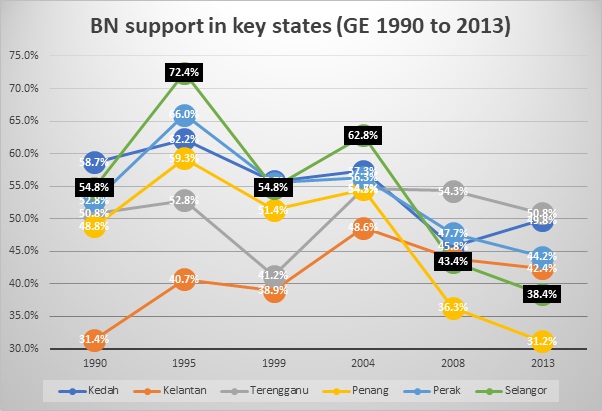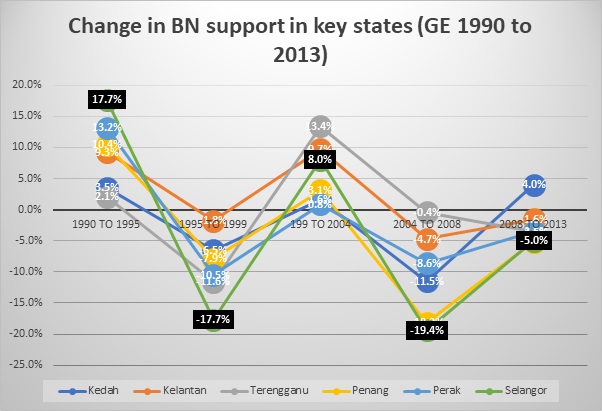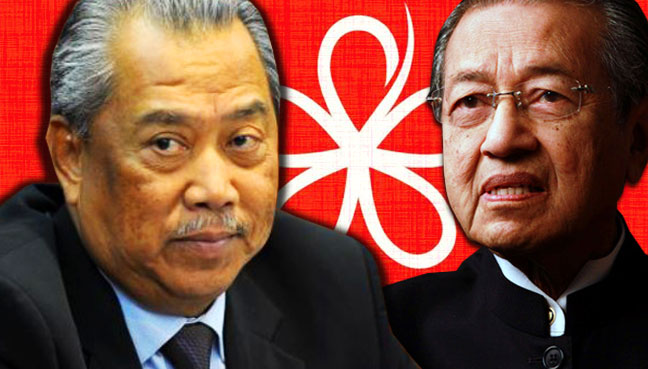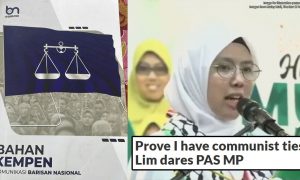Can Pakatan get S’gor if PAS doesn’t cooperate? Kian Ming and RPK offer two outcomes

- 590Shares
- Facebook414
- Twitter21
- LinkedIn18
- Email37
- WhatsApp100
Ever since Selangor fell to the opposition’s Parti Keadilan Rakyat (PKR), the Barisan Nasional (BN) had been prepping themselves up to win back Selangor.
“For two terms now, Selangor (BN) politicians have had to depend on the federal government to get projects and contracts to sustain themselves. With the opposition in control of the state, Umno can only look from afar at how the wealth of Selangor has escaped them ,” – Hisommudin Bakar, executive director of the Ilham Centre, for The Malaysian Insight.
And rightfully so. The importance of Selangor in Malaysian politics could not be overstated. Besides being the richest state in the country if you look at its GDP per capita, Selangor is also the most populous state in Malaysia. The stakes are pretty high, so winning or losing elections in Selangor is a pretty big deal.
From targeting certain districts to antics against the current government to allegedly organizing coups, the past few months had casual observers and political analysts alike following the developments with great interest. With the 14th General Election (GE) close at hand, the dramas and controversies surrounding the battle for Selangor are getting more and more dramatic.

Maybe not this dramatic… yet. Source
Who will win Selangor in the next GE? Will PKR continue to rule, or will BN make a comeback? Will the dark horse of the race, the Pan-Islamic Party of Malaysia (PAS) rise up and claim the throne? Dr Ong Mian King, the election strategist for the Democratic Action Party (DAP) crunched some numbers and came up with some insights regarding those questions.
These insights came in the form of a series of media statements titled “The Battle for Selangor” on his blog, and you can read Part 1, Part 2 and Part 3 by clicking on these links. In response to Ong’s media statements and predictions for the next GE, Raja Petra Kamaruddin, a former PKR politician and the editor of Malaysia Today also weighed in on the matter, but we’ll get to that later. For now, Ong revealed some interesting trends in his statements, and one of them is that…
Selangor’s voters aren’t loyal to a certain party
In his statement, Ong revealed that Selangor’s voters are the most ‘sophisticated’ in the country, and therefore the most volatile. By looking at the results of the past elections in six key states (Kedah, Kelantan, Terengganu, Penang, Perak and Selangor), Ong saw that while the support for the BN coalition in these states fluctuate over time, the changes in Selangor’s support seemed to be the biggest.

Support for BN in the six states. Source
Ong attributed this lalang-ness to the fact that a large number of Selangor’s voters aren’t originally from Selangor: most of them moved in from other states for better job and education opportunities, therefore they are not as deeply attached to a certain political party. This makes them quick to reward good performance, and also quick to punish bad performance.
For example, the 1995 GE saw support from BN rising to 72.4% from 1990’s 54.8%, attributed to the Malaysia’s booming economy during the East Asian miracle years from the early 1990s, until the Asian economic crisis happened in 1997. This caused the support for BN to fall back to 54.8% during the 1999 Reformasi elections, but rebounded to 62.8% in 2004 during the Pak Lah reign, where he promised to clean up corruption and taking a collaborative approach by asking the people to ‘work with him, not for him‘. But Pak Lah failed to deliver, and BN’s support went downhill from there, dropping to 43.4% in the 2008 BN backlash elections and further to 38.4% in 2013’s GE.

Changes in BN support for the five states. Source
With these observations in place, Ong felt that there is nothing in BN’s recent track record that would prompt Selangor’s voters to vote for BN in the next election. While Ong admitted that the current state government’s performance had not been perfect, he stated that some changes can be felt by both the voters as well as investors, as investments and jobs continue to pour into Selangor. There is also the contrast in popularity between Selangor’s Menteri Besar, Azmin Ali and the current Prime Minister, Najib Razak.
While this may sound like an almost sure win for the Pakatan Harapan (PH), the coalition PKR’s under, it’s not as simple as Pakatan vs BN. The Pan-Malaysian Islamic Party (PAS) will also probably be contesting for Selangor’s seats, causing a three-way battle.
There is a chance PAS will take away votes from PKR
Malaysia basically holds her elections using a first-past the post system, which essentially means that each person gets a right to vote for a candidate that they like best, and the candidate with the most votes win. However, there are a few problems with that. This video does a good job of explaining the potential problems:
While the video highlights several problems, of particular importance in the issue of a PAS-PKR-BN three way is the one highlighted at the 5.00 mark: the possibility of The Spoiler Effect. Basically, when two popular parties contest, the competition should be quite close, with both sides having possible chances of winning the election. However, a third party getting in on the action might split the voters of one party into smaller parts, giving a huge advantage to the other party.

Illustrated form of the above para. Source
In this particular case, a three corner fight will probably result in a victory for BN, as evidenced in the Sungai Besar and Kuala Kangsar by-elections in 2016, where BN won with a majority against both PAS and AMANAH. While Ong had admitted that a straight fight against BN without PAS would be ideal, he had outlined a few reasons why PAS contesting would not hamper the PH.
One of them is the fact that things have changed since 2016: back then, the Parti Pribumi Bersatu Malaysia (PPBM) had not yet came into being, Tun Mahathir and Muhyiddin were still in Umno, the PPBM had not yet joined Pakatan, and there were no obvious line-up of Pakatan leaders that can form a government should they win. Ong had stated that basically, back in 2016 it wasn’t apparent to the voters that there could be a solid alternative to vote for, and now there is. And since PAS did not belong to either coalition, PAS could not possibly form a government on its own.

But they can try. Source
The second reason according to Ong is that despite PAS having won 15 state and 4 parliament seats in the last GE, it’s a pretty close competition. It’s a recent win, too, as PAS did not win any parliamentary seats from 1990 to 2004. Despite being the largest opposition party in the parliament during the 1999 Reformasi elections, PAS only managed to get four state seats in Selangor. PAS winning the elections in Selangor is a new development, and while Ong admitted that the victories of PKR and DAP are also new, both parties are part of a larger coalition whereas PAS stands alone.
The final reason is that the seats that PAS won isn’t through Malay support. It was estimated that only an average of 40% of Malays voted for PAS in the seats that it won. The reason for PAS winning 14 out of 15 state seats in the last GE is due to support from the non-Malays in these seats: 88% Chinese voters and 68% Indian. Ong predicted that the only reason PAS won the Malay support for Seri Serdang, Paya Jaras and Morib is due to the coalition it was in rather than the strength of PAS itself.

Essentially the new campaign. Source
To counter the effects of PAS being in the running, Ong had suggested a few strategies for the Pakatan, and it mainly involves persuading the fence-sitters and PAS sympathizers to support Pakatan in the next GE. Ong is confident that with the popularity of Azmin Ali, especially among the Selangor Malay community, the Pakatan may be victorious in the next GE.
You may have wondered why is the support of the Malay community a factor in determining whether a party can win or lose an election in Selangor. Malays and Bumiputras make up a hefty slice of the voter pie, making up an estimated 68.8% of the population, and comprising at least 40% of the demography even in states like Penang where Malays are not the majority. And that brings us to an important point…
Even though Pakatan may win Selangor, there’s still the whole war to win

Raja Petra runs the Malaysia Today site. Source
In response to Ong’s analysis on how PAS won on the votes of Chinese and Indian voters, Raja Petra Kamarudin had pointed out that DAP is highly dependent on Malay votes as well, being only able to rule in Penang should they fail to woo Malay voters. In his article, Raja had stated that DAP won Perak and Selangor due to Malay votes, and without those votes retaining these states would prove difficult.
While it wasn’t stated outright in Ong’s statements, Raja had said that Ong saying that PAS won due to the support of Chinese and Indian voters is an admittance that DAP was the one asking them to vote for PAS. With PAS no longer in the coalition, garnering the support of non-Malay voters is an impossibility for PAS. While before it was alleged that the reason PAS was in the coalition was to get the support of Malay voters, now that PAS is out, the ones to win the hearts of Malays for the Pakatan will be Dr Mahathir and the Parti Pribumi Bersatu Malaysia (PPBM).

The PPBM is run by two ex-Umno members, Mahathir Mohamad and Muhyiddin Yassin. Source
Raja further stressed that if the Pakatan really intend to win the elections and form a federal government, they will have to win more than just the 50 ‘Chinese seats’ out of the 222 in the Parliament. At best, Raja estimated that the Pakatan will only be able to win ten or so of the 57 seats in Sabah and Sarawak, which means that to form a federal government, the Pakatan will have to win another 70 ‘non-Chinese’ seats in West Malaysia, which is quite a number.
“You do not need to be a maths genius to figure it out. If Pakatan wins 50 Chinese seats plus another 10 from East Malaysia (which would technically still be part of those ‘Chinese’ seats), that means they need to win another 70 non-Chinese seats in West Malaysia. And those are the seats PKR and Mahathir are supposed to deliver.” – Raja Petra Kamarudin, from Malaysia Today.
It was estimated that PKR will at most be able to win 30 seats, which left another 40 seats for Mahathir and the PPBM to win. And the only way for the PPBM to get those seats is by winning them from Umno. While the PPBM is currently working on that, it would seem that a Malay tsunami for the Pakatan is no easy task.
“Bersatu (PBBM) with Muhyiddin will have to counter the Umno juggernaut while Amanah will have to uproot the PAS rural support base, both of which are daunting tasks. So it does take the whole PH to effectively play their differentiated roles without undue internal catfights, such as over seat allocations,” – Oh Ei Sun, adjunct senior fellow at S. Rajaratnam School of International Studies, Singapore, told the Malay Mail Online.
Ong had came up with a few scenarios for the next general elections, and by his projections even the most pessimistic estimates showed that PAS will not hinder the Pakatan in its battle with BN, whose support is said to be on the decline. While things are looking good for the Pakatan in Selangor, perhaps it would serve the Pakatan well to look at the bigger picture if they intend to form the next federal government.
- 590Shares
- Facebook414
- Twitter21
- LinkedIn18
- Email37
- WhatsApp100






